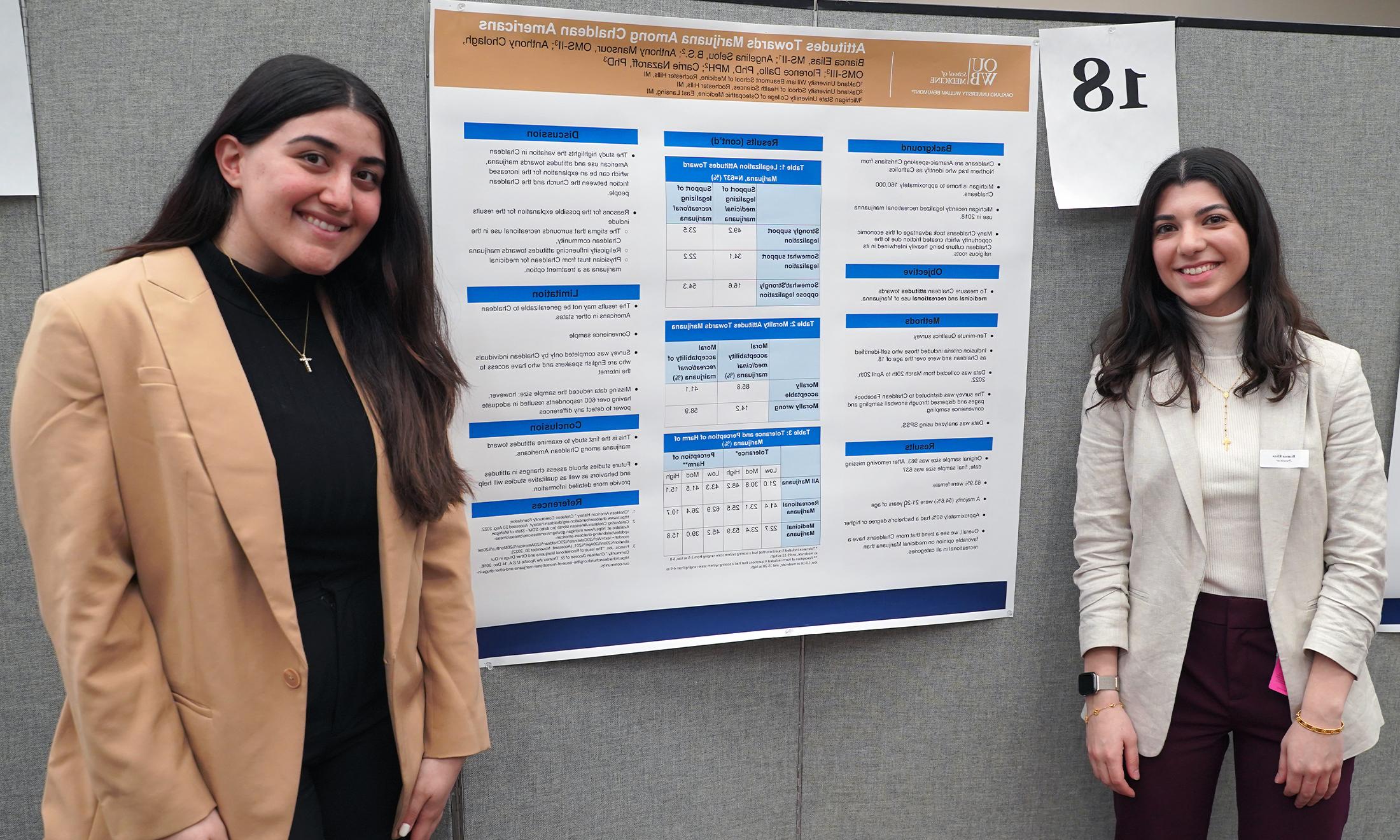大麻的冲突
Study featuring OUWB student as lead author looks at ‘friction’ over marijuana in Chaldean community

比安卡伊莱亚斯, M2, 以及十大菠菜台子公共卫生专业的毕业生, 安吉丽娜塞卢斯, 是研究团队的一员吗. (摄影:Andrew Dietderich)
A second-year medical student from 十大菠菜台子 William Beaumont School of Medicine is lead author on what is believed to be a first-of-a-kind study on attitudes toward marijuana among Chaldean Americans.
这项研究, 《迦勒底美国人对大麻的态度,” was first presented at the 十大菠菜台子 Graduate 研究 Conference on March 10.
比安卡伊莱亚斯, M2, was part of the team that studied that found Chaldean Americans are generally more supportive of the legalization of medical marijuana and opposed to recreational marijuana.
这项研究 also addresses the attitudes and beliefs leading to what is described as “friction between the church and Chaldean people.“特别, between those who seek to take economic advantage of Michigan’s marijuana laws and those who remain opposed to the drug.
作为有抱负的医生, it's important for medical students to take the lead in studying what their community is consuming to better understand the potential impact on their patients,以利亚说.
“通过洞察这些消费和态度模式, medical students can determine how best to approach patients and address potentially controversial or sensitive topics during physician-patient interactions,她补充道.
“This is why we believe it makes sense for medical students to lead such a study.”
“道德问题”
迦勒底人通常来自伊拉克北部, 谁说亚拉姆语或迦勒底语, 倾向于认为自己是天主教徒.
About 160,000 Chaldeans live in southeast Michigan, making it the largest community outside of Iraq.
Michigan voters legalized the recreational use of marijuana in 2018. (Marijuana remains classified as a Schedule 1 substance under the U.S. 1970年的受控物质法案.)
| 更多来自OUWB |
Study led by OUWB students finds TikTok medical videos can be improved Study by OUWB students finds heavy use of supplemental learning tools |
根据这项研究, many Chaldeans took advantage of the economic opportunity presented by the legalization of marijuana in Michigan — including opening dispensaries to sell the drug.
Concurrently, however, officials at Chaldean churches have denounced the use of recreational drugs.
在一个 迦勒底人的新闻 文章名为"日益增长的担忧“最尊敬的弗朗西斯. 卡拉巴特,圣加色丁教区主教. 使徒多马, said “he emphatically believes that the current unrestricted recreational distribution is unhealthy and immoral, 造成了一种席卷整个社区的流行病.”
“There is nothing intrinsically wrong with marijuana,” said Kalabat, according to 迦勒底人的新闻. “但当它被用于非医疗目的时, 它改变大脑的特性弊大于利, 它变成了逃避现实. 这是一个需要解决的道德问题.”
这个信念, coupled with the fact that some Chaldeans want to take advantage of Michigan’s marijuana laws, 是否在社区内部引发冲突.
“It’s created such a friction in our community that we really wanted to look at how people felt about it,她补充道。.
方法和结果
研究小组由三名医学生组成(Elias, 还有安东尼·乔拉格和安东尼·曼苏尔, 都来自密歇根州立大学), 以及十大菠菜台子公共卫生专业的毕业生, 安吉丽娜塞卢斯. 该团队由弗洛拉·达洛博士(Flora Dallo)担任顾问.D., professor and associate dean in the School of 健康科学 at 十大菠菜台子.
“(Marijuana) is a very spoken-about topic so we wanted to put some numbers to it,” says Selou. “Everyone thinks they know how everyone else feels…let’s put some statistics together and see what people actually feel.”
因此,该团队开发了一个10分钟的调查.
Inclusion criteria consisted of those who self-identified as Chaldean and were over the age of 18. 数据收集于2022年3月20日至4月20日.
The survey was distributed via Chaldean 脸谱网 pages and dispersed through snowball and convenience sampling. 最终的样本量包括637名受访者.
结果发现,.2%的人支持医用大麻合法化,23%的人支持.5%的人支持娱乐性大麻合法化.
此外,16.6% somewhat or strongly oppose legalization of medicinal marijuana, while 54.3% somewhat or strongly oppose legalization of recreational marijuana.
“我们可以清楚地看到药用大麻, 大多数人强烈或多少支持大麻合法化,以利亚说. “但当我们看娱乐节目时, we can see that totally flips and most people are strong or somewhat opposed to legalization. 我们在道德方面也看到了类似的趋势.”
Almost 86% of survey respondents said that medicinal marijuana is morally acceptable. Conversely, almost 60% reported feeling that recreational marijuana is morally wrong.
Per the study, reasons for the possible explanation of the results include:
- A stigma that surrounds recreational use in the Chaldean community.
- 宗教信仰影响对大麻的态度.
- Physician trust from Chaldeans for medicinal marijuana as a treatment option.
这项研究 does have its limitations: the survey was completed only by Chaldean individuals who speak English and have access to the internet; missing data reduced the sample size from 963 to 637; and the researchers drew from a convenience sample.
Still, the study authors believe the work is a good first step in better understanding.
“Since the likelihood of encountering Chaldean patients is high for medical students in the metro Detroit area, it is crucial for them to read research related to this population to gain further insights into their patients,以利亚说.

 2023年4月27日
2023年4月27日 作者:Andrew Dietderich
作者:Andrew Dietderich

